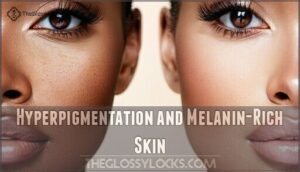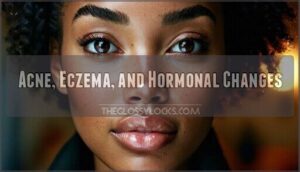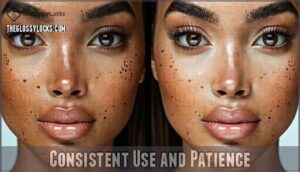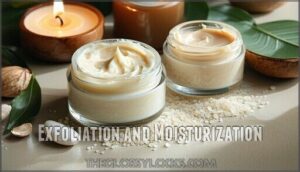This site is supported by our readers. We may earn a commission, at no cost to you, if you purchase through links.
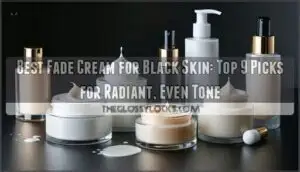
Clear Essence Platinum Medicated Fade Creme with sunscreen is a popular choice, offering sun protection alongside spot correction. If you prefer natural formulas, try SheaMoisture African Black Soap Moisturizer.
Options with active ingredients like niacinamide, retinol, or vitamin C, such as Palmer’s Eventone Fade Cream, can also work wonders.
Remember, consistent use and SPF are key. Your skin’s story deserves a radiant finish, so keep reading for more tips to brighten and balance your tone.
Table Of Contents
- Key Takeaways
- Choosing Best Fade Creams
- Top 9 Fade Creams
- 1. Palmer’s Fade Cream Dry Skin
- 2. USRx Retinol Rapid Repair Treatment
- 3. Palmer’s Eventone Fade Cream Oily Skin
- 4. Neocutis Neo Firm Neck Cream
- 5. Cetaphil Daily Facial Moisturizer SPF 15
- 6. Palmer’s Cocoa Butter Night Cream
- 7. Aveeno Radiant SPF 15 Moisturizer
- 8. SheaMoisture African Black Soap Moisturizer
- 9. Olay Complete Lotion SPF 15 Moisturizer
- Causes of Dark Spots
- Applying Fade Creams Effectively
- Maintaining Healthy Skin Tone
- Frequently Asked Questions (FAQs)
- What fades dark spots on black skin?
- How can I lighten my black skin?
- How can I make my black skin look younger?
- What is the best skin lightening cream?
- What is the best skin lightening cream for black skin?
- How to lighten African American skin?
- Does fade cream lighten skin?
- Does Ambi fade cream make skin lighter?
- How long does fade cream take to work?
- Can fade cream be used on sensitive skin?
- Conclusion
Key Takeaways
- Look for fade creams with ingredients like niacinamide, vitamin C, and kojic acid, which gently target dark spots and hyperpigmentation without harming melanin-rich skin.
- Always pair your fade cream with sunscreen to prevent further discoloration and boost the product’s effectiveness.
- Consistent use is key for results—most creams take 4 to 8 weeks to show visible improvement, so patience pays off.
- Avoid harsh ingredients like hydroquinone in favor of natural formulas that reduce irritation and support healthy, glowing skin.
Choosing Best Fade Creams
Choosing the right fade cream means looking for safe, effective ingredients like vitamin C, kojic acid, and niacinamide.
You should avoid harsh options like hydroquinone, which can irritate darker skin tones, and instead look for safe ingredients that promote healthy skin.
Natural Ingredients for Skin Brightening
For brightening your skin and tackling dark spots, natural ingredients work wonders.
Kojic acid, Vitamin C, and Licorice Extract are tyrosinase inhibitors that reduce melanin production, promoting an even skin tone. Fruit Enzymes gently exfoliate, revealing radiant skin.
Kojic acid, Vitamin C, and Licorice Extract work as skin brightening heroes, reducing melanin for a glowing, even complexion.
Plant Extracts support hyperpigmentation treatment effectively. Many consumers are now turning to natural skin brighteners for safer alternatives.
These powerhouse ingredients guarantee safe, effective skin brightening with visible improvement in tone and texture over time.
Hydroquinone-Free Formulas for Darker Skin
When choosing a fade cream for dark skin, hydroquinone-free options are often better for sensitive skin.
They use natural alternatives like kojic acid, vitamin C, and licorice extract for skin brightening.
Here’s why they’re worth trying:
- Reduce dark spots without irritation.
- Support even tone safely.
- Work as a hyperpigmentation treatment.
- Use smart melanin technology.
Many people seek a hydroquinone-free solution for skin concerns, making natural alternatives a popular choice.
Retinol and Niacinamide for Hyperpigmentation
How do you tackle hyperpigmentation while being gentle on black skin?
Retinol boosts cell turnover, fades dark spots, and improves skin texture, while niacinamide strengthens your skin barrier and reduces melanin production.
Using them together enhances their benefits and minimizes irritation.
| Retinol Benefits | Niacinamide Effects | Combined Efficacy |
|---|---|---|
| Fades dark spots | Reduces melanin | Boosts skin appearance |
| Increases collagen | Improves skin barrier | Minimizes irritation |
| Smooths texture | Soothes sensitivity | Fights hyperpigmentation |
| Reduces aging | Brightens tone | Works for black skin |
Top 9 Fade Creams
Finding the right fade cream for your skin can feel overwhelming, but it doesn’t have to be.
Here’s a list of nine top-rated options designed to target dark spots and even your skin tone effectively.
1. Palmer’s Fade Cream Dry Skin
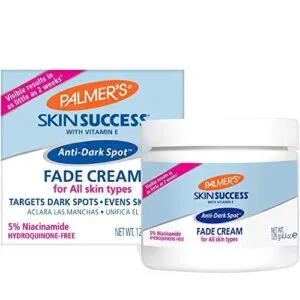
Palmer’s Fade Cream for Dry Skin is a top choice for tackling dark spots and discoloration.
Its creamy formula hydrates deeply, featuring niacinamide to brighten and Shea Butter to nourish.
Vitamin C and retinol help fade pigmentation while improving texture and radiance.
Free of hydroquinone and harsh chemicals, it’s gentle yet effective, even on sensitive skin.
Clinical studies show significant results within weeks.
It’s a straightforward way to achieve smoother, even-toned skin while keeping dryness at bay.
Don’t skip daily sunscreen!
Palmer’s Fade Cream is a solution that includes Vitamin C to help achieve the desired skin tone.
Best For: Individuals with dry, sensitive skin seeking to reduce dark spots, discoloration, and improve skin texture.
- Hydrating formula with Shea Butter and plant-based ingredients.
- Includes niacinamide, retinol, and Vitamin C for brightening and improved skin tone.
- Clinically proven results within 2-6 weeks.
- May cause adverse reactions like swelling or irritation for some.
- Results may vary depending on skin type and condition.
- Requires consistent use with sunscreen for best outcomes.
2. USRx Retinol Rapid Repair Treatment
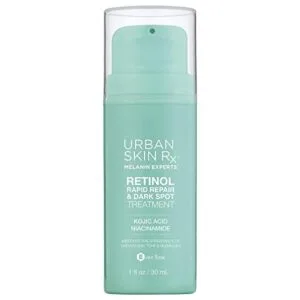
USRx Retinol Rapid Repair Treatment is a powerhouse for targeting hyperpigmentation and uneven skin tone.
With retinol, kojic acid, and niacinamide, it exfoliates, smooths, and brightens skin effectively.
It’s fast-absorbing, fragrance-free, and perfect for melanin-rich skin.
Apply sparingly at night and build up gradually to avoid irritation.
Don’t forget sunscreen—it increases sun sensitivity.
Users report smoother skin and fewer dark spots, though results can vary.
Pair it with the right skincare routine for the best outcome.
A little goes a long way!
Best For: Individuals with melanin-rich skin seeking to address hyperpigmentation, uneven tone, and signs of aging.
- Contains effective ingredients like retinol, kojic acid, and niacinamide.
- Fast-absorbing, fragrance-free formula suitable for diverse skin tones.
- Improves uneven skin tone, texture, and stubborn dark spots over time.
- May cause irritation or breakouts during the adjustment period.
- Increases sun sensitivity, requiring diligent sunscreen use.
- Results may vary, requiring long-term commitment for visible improvement.
3. Palmer’s Eventone Fade Cream Oily Skin
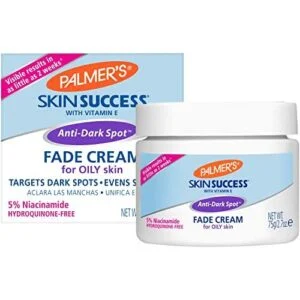
If oily skin drives you crazy, Palmer’s Eventone Fade Cream is worth a look.
It’s formulated to reduce dark spots, age spots, and uneven skin for melanin-rich tones. Packed with niacinamide, retinol, and vitamin C, it brightens while managing excess oil.
You’ll love the lightweight, non-greasy feel. Clinical studies show 100% improvement in discoloration after 4 weeks.
Apply daily, but rub thoroughly to avoid residue. Pair with sunscreen, and you’re on your way to radiant, even-toned skin!
Best For: People with oily or melanin-rich skin looking to reduce dark spots, age spots, and achieve an even skin tone.
- Contains niacinamide, retinol, and vitamin C for brightening and texture improvement.
- Lightweight, oil-free formula designed for oily skin.
- Clinically proven to visibly improve discoloration in 4 weeks.
- May cause irritation or breakouts for some users.
- Results may take up to 6 weeks and spots may return after discontinuation.
- Can leave an oily residue if not fully absorbed.
4. Neocutis Neo Firm Neck Cream
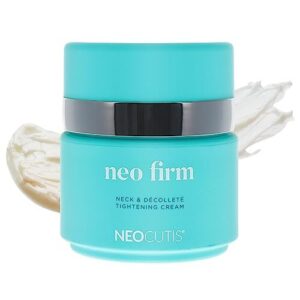
Neocutis Neo Firm Neck Cream is your go-to for firming the neck and décolleté area.
With powerful peptides, it supports collagen and elastin production, improving skin’s elasticity.
Glycolic acid smooths crepey skin and reduces age spots, while stabilized Vitamin C defends against oxidative stress.
Sodium Carboxymethyl Betaglucan tightens, and beet root extract conditions and protects.
Its rich, non-greasy texture absorbs swiftly, leaving your skin nourished and youthful.
Though pricey, consistent use delivers noticeable results, making it worth every penny, with powerful peptides being a key factor.
Best For: Adults seeking a high-end, effective solution for firming and rejuvenating the neck and décolleté area.
- High price point may not suit all budgets.
- Limited availability for wholesale purchase.
- Occasional reports of products arriving opened or used.
- Promotes collagen and elastin production for improved skin elasticity.
- Reduces crepey skin, age spots, and uneven tone with glycolic acid.
- Rich, non-greasy formula absorbs quickly and nourishes deeply.
5. Cetaphil Daily Facial Moisturizer SPF 15
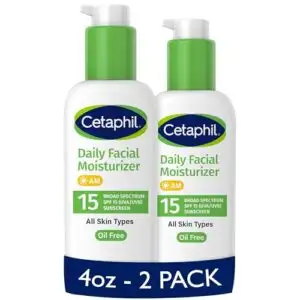
Cetaphil Daily Facial Moisturizer SPF 15 offers lightweight hydration and sun protection for sensitive skin.
Its fast-absorbing formula provides broad-spectrum defense against UVA and UVB rays, helping to prevent sun-related dark spots.
With nourishing ingredients like glycerin and tocopheryl acetate, it strengthens your skin’s moisture barrier while keeping it soft and smooth.
This paraben-free, fragrance-free, and non-comedogenic cream won’t clog pores or irritate delicate skin.
It’s gentle enough for everyday use and perfect for layering under makeup, helping you stay protected and glowing daily.
Best For: Those with sensitive skin seeking daily lightweight hydration and moderate sun protection.
- Lightweight and non-greasy formula absorbs quickly.
- Broad-spectrum SPF 15 protects against UVA/UVB rays.
- Free from parabens, added fragrance, and pore-clogging ingredients.
- SPF 15 may not provide sufficient protection for extended sun exposure.
- Some users may experience mild irritation or itchiness.
- Requires reapplication during prolonged sun exposure.
6. Palmer’s Cocoa Butter Night Cream
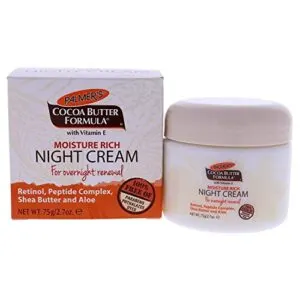
Palmer’s Cocoa Butter Night Cream works wonders while you sleep.
Packed with cocoa butter, retinol, and vitamin E, it nourishes and restores your skin overnight.
The non-comedogenic formula blends hydration with anti-aging benefits, leaving your face smooth and radiant by morning.
It’s dermatologist-tested and absorbs quickly without feeling greasy.
This cream targets fine lines and uneven tone, making it ideal for melanin-rich skin.
Apply consistently at night to see noticeable improvements within weeks.
Wake up with a softer, healthier complexion!
Best For: People looking for an overnight moisturizer that hydrates, reduces fine lines, and enhances skin radiance, including those with sensitive or melanin-rich skin.
- Mild chemical scent that not everyone may like.
- Some users find it less moisturizing than expected.
- Glass jar packaging is heavier and less travel-friendly.
- Non-comedogenic and safe for sensitive skin.
- Promotes softer, smoother, and radiant skin overnight.
- Absorbs quickly without leaving a greasy feel.
7. Aveeno Radiant SPF 15 Moisturizer
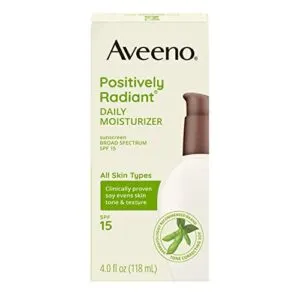
Aveeno Radiant SPF 15 Moisturizer might just make your skincare routine a breeze.
It’s packed with Total Soy Complex to fight dark spots, dullness, and uneven texture.
With broad-spectrum SPF 15, it protects your skin while improving its tone.
The oil-free, lightweight formula absorbs fast, leaving no greasy feel—perfect under makeup.
Users love its gentle touch on sensitive skin and its ability to hydrate while enhancing radiance.
If you’re aiming for a brighter, even complexion, this moisturizer is worth trying.
Best For: Adults and teens seeking a lightweight, oil-free moisturizer with SPF 15 for daily sun protection and improved skin tone.
- Improves skin tone, texture, and radiance while reducing dark spots.
- Lightweight, fast-absorbing formula perfect under makeup.
- Suitable for sensitive and dry skin, with no irritation reported.
- SPF 15 may be insufficient for strong sun protection compared to SPF 30 or higher.
- New formulation (brown top) perceived as greasier by some users.
- Price may seem high for the small 4-fluid ounce bottle size.
8. SheaMoisture African Black Soap Moisturizer
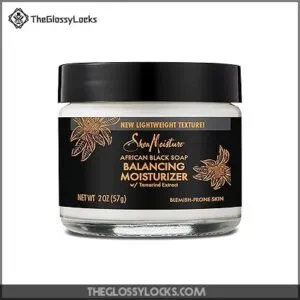
SheaMoisture African Black Soap Moisturizer balances hydration with ease.
It’s lightweight yet powerful, perfect for oily or combination skin. With African Black Soap and fair trade Shea Butter, it soothes and nourishes while promoting a healthy complexion.
The formula is free of parabens and cruelty, making it ideal for sensitive skin. Users love its ability to reduce acne and refine pores, leaving skin smooth and shine-free.
Apply daily for a hydrated, glowing finish—great for under makeup or standalone use, and enjoy the benefits of African Black Soap and fair trade Shea Butter.
Best For: Those with oily or combination skin seeking a lightweight, natural moisturizer that balances hydration and reduces acne.
- Lightweight, non-greasy formula suitable for daily use
- Contains African Black Soap and fair trade Shea Butter for nourishment
- Free of parabens, phthalates, and cruelty
- Some users report burning or stinging around the eyes
- Occasional inconsistencies in product texture or quality
- Packaging issues, such as damaged or unsealed containers
9. Olay Complete Lotion SPF 15 Moisturizer

Offering lightweight hydration with SPF 15, Olay Complete Lotion SPF 15 Moisturizer is a great pick for daily skin care.
Its oil-free, non-greasy formula absorbs quickly, leaving your skin feeling smooth and fresh. Enriched with vitamins E, B3, and C, it nourishes while protecting against sun damage, a leading cause of dark spots.
Designed for combination and oily skin types, it’s soothing and gentle enough for sensitive skin. Protect and brighten your complexion without the heavy feel – a true multitasker!
Best For: People with combination or oily skin looking for lightweight hydration and SPF protection in a non-greasy formula.
- Provides 48 hours of hydration with a lightweight, non-greasy feel.
- Contains SPF 15 with UVA/UVB protection to prevent premature skin damage.
- Enriched with vitamins E, B3, and C for healthy, nourished skin.
- SPF 15 may be too low for those seeking stronger sun protection.
- Recent formula changes in thickness and scent have received mixed feedback.
- Availability in physical stores can be inconsistent.
Causes of Dark Spots
Dark spots happen when your skin makes extra melanin in certain areas. This can be caused by acne, eczema, hormonal changes, or too much sun exposure.
Hyperpigmentation and Melanin-Rich Skin
Hyperpigmentation happens when melanin production goes into overdrive.
For black skin, this often leads to uneven skin tone or stubborn dark spots. Post-inflammatory hyperpigmentation, from acne or irritation, is another culprit.
Increased sun sensitivity makes matters worse. Preventative measures, like daily sunscreen and fade cream, help to mitigate this issue.
Choose products designed for melanin-rich skin to safely target hyperpigmentation without causing harm, and consider using fade cream as part of your skincare routine.
Acne, Eczema, and Hormonal Changes
Hormonal acne, eczema flare-ups, and melasma triggers can lead to acne pigmentation and post-inflammatory hyperpigmentation in black skin.
Hormone shifts from stress or menstrual cycles often worsen skin inflammation and discoloration.
Acne and eczema leave dark spots if untreated.
To reduce skin discoloration, balance hormones, use fade creams, and nurture your skin with exfoliation and sunscreen for lasting results.
Applying Fade Creams Effectively
Using fade creams correctly can make a big difference in how well they work. Apply them consistently on clean, dry skin and follow the instructions to see the best results.
Apply fade creams consistently on clean, dry skin for noticeable results—patience and a steady routine are your best allies!
Consistent Use and Patience
Consistency is key when using a fade cream for dark spots on dark skin.
To see visible results, you’ll need patience and realistic expectations—most products take weeks, not days.
Adherence matters; missing applications can delay progress.
Stick to a routine and focus on long-term benefits. Managing disappointment is easier when you trust consistent usage to target hyperpigmentation effectively.
Combining With Balanced Diet and Exercise
A balanced diet and regular exercise don’t just keep you feeling good—they feed your skin too.
Nutrient-rich foods boost melanin reduction and promote an even skin tone.
Exercise improves circulation, helping fade creams reach those dark spots faster.
A holistic approach that blends lifestyle integration with skincare delivers visible results and supports overall wellness for glowing, healthy dark skin, promoting overall wellness.
Exfoliation and Moisturization
Exfoliation gently removes dead skin cells, helping fade creams penetrate better.
Moisturization, especially with hydrating ingredients like shea butter and glycerin, restores the skin barrier.
After exfoliating, always follow with a moisturizer to lock in hydration and prevent dryness, which can improve tone, reduce hyperpigmentation, and boost hydration benefits, leaving your skin smoother and healthier over time.
Maintaining Healthy Skin Tone
You can maintain a healthy skin tone by nourishing your skin and protecting it from damage.
Use fade creams consistently, pair them with sunscreen, and choose products backed by clinical proof and user reviews.
Nourishing and Strengthening The Skin
Your skin barrier is the foundation of healthy, even skin tone.
Strengthen it with fade creams containing antioxidants and hydration-boosting ingredients.
Look for products that support lipid balance and collagen production.
For dark skin, maintaining ideal hydration levels and protecting against hyperpigmentation or skin discoloration is key.
Healthy skin glows naturally, so nourish it daily to prevent damage.
Improving Skin Texture and Tone
Aiming for radiant skin starts with addressing texture concerns.
A quality fade cream can smooth rough patches and boost tone enhancement for an even complexion.
Dark skin benefits from formulas that nourish while targeting hyperpigmentation.
Incorporating ingredients like retinol or niacinamide refines skin texture, promoting smoothness benefits and an even skin tone you’ll notice with consistent use.
Preventing Dark Spots and Hyperpigmentation
Preventing dark spots and hyperpigmentation requires routine consistency.
Start with daily sunscreen—skin protection is key.
Pairing a fade cream with gentle exfoliation boosts results and helps even skin tone.
A healthy diet matters too, as diet and spots are often linked.
For dark skin, focus on hydration and products designed to target hyperpigmentation while nurturing radiance.
Clinical Proof and User Reviews for Product Selection
Strong clinical trials and user testimonials help you choose the best fade cream.
Look for proven ingredient efficacy, like hydroquinone or tranexamic acid, along with dermatologist-recommended options.
Brands with solid safety profiles and positive reviews build trust.
For black skin tackling hyperpigmentation, products like Topicals Faded Serum or Palmer’s Eventone deliver results backed by research and happy users.
Customers can find detailed product insights online.
Frequently Asked Questions (FAQs)
What fades dark spots on black skin?
To fade dark spots on black skin, use creams with vitamin C, kojic acid, or niacinamide.
These target hyperpigmentation gently.
Pair with sunscreen daily to prevent further darkening and protect your skin’s progress.
How can I lighten my black skin?
Chasing lighter skin? Instead, boost your glow with safe options like vitamin C, niacinamide, and sunscreen.
These brighten tone, fade spots, and protect melanin-rich skin from harm.
Patience and consistency are your secret weapons.
How can I make my black skin look younger?
Focus on hydration, sunscreen, and products with retinol or vitamin C to boost collagen and brighten skin.
Exfoliate gently to reveal fresh skin.
Adopt a balanced diet and stay consistent with your skincare routine.
What is the best skin lightening cream?
The best skin lightening cream depends on your needs.
Try Meladerm for overall results or Topicals’ Faded cream for targeted spots.
Look for kojic acid, vitamin C, or niacinamide.
Always pair with sunscreen.
What is the best skin lightening cream for black skin?
Brighten beautifully with Palmer’s Skin Success Anti-Dark Spot Fade Cream.
It blends natural ingredients like niacinamide and retinol, working wonders on hyperpigmentation for melanin-rich skin.
Pair it with sunscreen daily for radiant, even results, utilizing retinol for optimal skin health.
How to lighten African American skin?
To lighten African American skin safely, use products with niacinamide, vitamin C, and kojic acid.
Pair them with sunscreen daily.
Consistent skincare, hydration, and gentle exfoliation are key for improving tone and texture over time.
Does fade cream lighten skin?
A fade cream won’t bleach your skin, but it can gently reduce dark spots and even out your tone.
It works by targeting hyperpigmentation, not your natural color, to enhance your skin’s radiance.
Does Ambi fade cream make skin lighter?
Ambi Fade Cream reduces dark spots and evens skin tone, but it doesn’t lighten your overall skin color.
Its active ingredients target hyperpigmentation, helping you achieve a balanced, radiant complexion with consistent use.
How long does fade cream take to work?
Think of using fade cream as planting a seed.
With consistent application, you’ll usually see changes in 4 to 8 weeks.
Results depend on your skin and routine, so patience is key.
Don’t skip sunscreen!
Can fade cream be used on sensitive skin?
Yes, you can use fade cream on sensitive skin, but choose gentle formulas.
Look for products with soothing ingredients like niacinamide or licorice extract.
Always patch test first to prevent irritation or reactions.
Conclusion
Imagine your skin glowing and dark spots fading after consistent care.
Choosing the best fade cream for Black skin isn’t difficult when you know what to look for. Focus on products with safe, effective ingredients like niacinamide or vitamin C.
Pair their use with SPF to prevent further discoloration and protect melanin-rich skin. Consistency matters—stick to a skincare routine, moisturize, and be patient.
With the right cream, achieving radiant, even skin tone is absolutely within reach.

